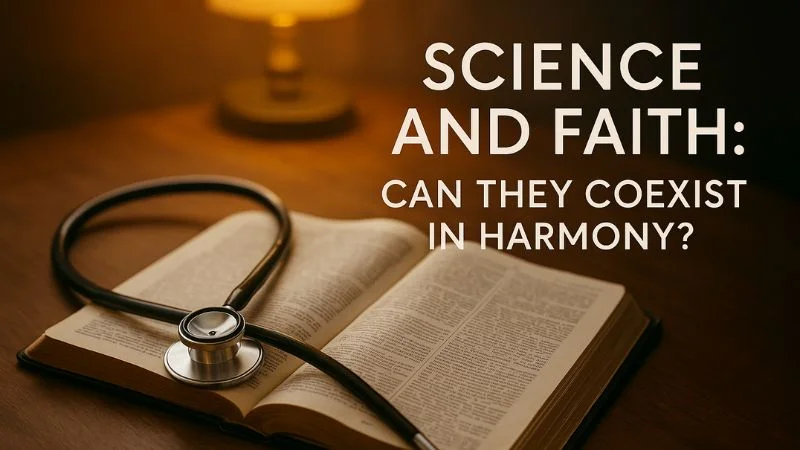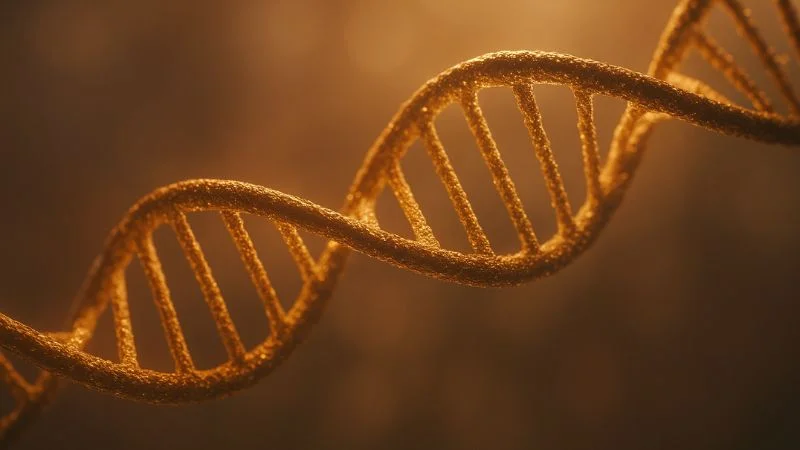
I worked in the laboratory for years. Every day, I handled samples that represented someone’s fears, questions, and hopes. A tube of blood may look simple, but to the person waiting, it can mean everything. I’ve seen the joy of promising results, as well as the heaviness when they aren’t what we prayed for.
Yet even surrounded by medical knowledge, machines, and scientific methods, my faith has never been in the tools themselves. My faith is in the Lord, the One who gives wisdom, sustains life, and holds every heartbeat.
So when people ask me, “Can science and faith really coexist?” I don’t answer from theory but from experience. I have held Scripture in one hand and a pipette in the other. I believe God can heal miraculously. I have also seen Him heal through medicine, skilled physicians, and research discoveries.
The question isn’t whether science and faith can coexist.
The real question is:
How do we hold both in a way that honors God?
What Science and Faith Are For

Sometimes science and faith feel like they are at odds because we ask them to answer the same questions. But they were never designed to do the same thing.
Science asks:
• How does the world work?
• How does the body heal?
• What causes disease?
• What laws govern the universe?
Science studies the physical, the measurable, and the observable.
Faith asks:
• Who created us?
• Why are we here?
• What gives life meaning?
• What happens after death?
• How should we live before God?
Faith speaks to what is spiritual, moral, and eternal.
We need both.
Science explains how creation functions.
Faith explains why creation exists in the first place.
Hebrews 3:4 says:
“For every house is built by someone, but God is the builder of everything.”
Science studies the house; faith introduces us to the Builder.
They are not enemies.
They are companions.
Why Some People Believe Science and Faith Must Conflict
Even though science and faith ask different questions, many assume we must choose between them. Here are a few reasons why:
1️⃣ Cultural Messaging
Society often tells us:
Be scientific or be religious.
But this is a false choice.
Many scientists in history were believers:
Isaac Newton, Louis Pasteur, Gregor Mendel, and countless others today.
2️⃣ Misunderstanding the Bible
Some people treat Scripture as if it were meant to explain every biological and chemical process. But the Bible was not written to be a lab manual. It was written to reveal God, to show His character, His salvation, and His purpose for us.
3️⃣ Misunderstanding Science
Science is not inherently anti-God; it simply studies what God created. It observes the order, patterns, and laws God designed. In fact, science is possible because creation is ordered, which itself points to a Designer.
4️⃣ Fear
Some Christians fear scientific discovery will weaken faith, while some scientists fear that belief in God will weaken credibility.
But truth does not fear examination.
All truth is God’s truth because He is the Creator of all that is true.
A Christian View: Science as Part of God’s Common Grace

The Bible teaches that God cares for humanity in many ways: some supernatural and some very practical.
He gives:
• Wisdom
• Skill
• Learning
• Understanding
• Creativity
• Curiosity
These are not accidents. They are gifts, given out of His grace.
Psalm 147:5 says:
“Great is our Lord and mighty in power; His understanding has no limit.”
That means every discovery we make is knowledge God already knows. Science doesn’t replace God; it simply traces His handiwork.
In the lab, this becomes very real. A correct diagnosis leads to the right treatment, and treatment leads to recovery. Relief returns. Joy is restored.
Families keep praying, yes, but they also see God working through those practical steps.
God often works through process.
God works through means.
God works through people.
Science is not separate from God’s care, but one of the ways He cares.
When Faith and Science Seem to Clash
Some topics, like creation, evolution, or the age of the earth, raise difficult questions. Faithful believers sometimes reach different conclusions. And that can feel unsettling.
But God never asked us to understand everything immediately.
Deuteronomy 29:29 says:
“The secret things belong to the Lord our God, but the things revealed belong to us…”
Some things God lets us learn through study.
Other things He keeps hidden until eternity.
Both require humility.
Faith does not cancel learning.
Learning does not cancel faith.
Mystery is not the enemy of belief.
Mystery invites trust.
When Christians Choose Prayer Instead of Medical Help
I know believers who choose to pray for healing without seeking medical treatment. Their faith is sincere and beautiful. And we must never criticize a heart that is truly relying on God.
But in my work as a laboratory scientist, I have also seen how God uses medicine to save lives. I have watched treatments bring healing and surgeries restore function. I have seen medication sustain those who would not survive without it.
We see this balance in Scripture, too:
• Luke was a physician (Colossians 4:14).
• Paul encouraged Timothy to take a remedy for his health (1 Timothy 5:23).
• Jesus healed a blind man using mud, a physical means (John 9:6–7), when He could have healed him instantly with a single command.
This reminds us that God is not limited to one method. He is the God of miracles, and He is also the God of means.
Faith is not ignoring the help God provides.
Faith is trusting God while wisely using what He gives.
How Science Can Strengthen Faith

For many Christians, myself included, studying science doesn’t weaken faith; it deepens it. The more we see how intricately the body functions, how the universe holds together, or how ecosystems sustain life, the harder it becomes to believe any of it happened by chance.
Scripture reflects this truth:
“I praise You because I am fearfully and wonderfully made.” — Psalm 139:14
“The heavens declare the glory of God…” — Psalm 19:1
Creation does not whisper God’s glory; it shouts it.
Science shows us the details of God’s handiwork. Faith shows us the meaning behind it. Together, they lead us to worship.
Faith answers why we exist: our purpose, our identity, and our eternal hope.
Science helps us understand how life functions on this side of eternity.
And when we allow them to work together, they do not compete; they harmonize.
They are like two lenses that help us see more clearly.
When science uncovers the details of God’s world, it doesn’t diminish His greatness; it magnifies it.
So, Can Science and Faith Really Coexist?
Yes. Absolutely.
They are not two voices fighting for dominance but two ways of seeing the same reality.
Science leads us to wonder.
Faith leads us to worship.
Science looks at the creation.
Faith looks to the Creator.
They can live together, beautifully, meaningfully, and faithfully.
Conclusion: Living in the Harmony of Both
In my years in the laboratory, I have seen both the power of medical knowledge and the power of prayer. I have seen healing that came through treatment and also healing that had no explanation other than the mercy of God.
I have friends whose faith leads them to rely solely on prayer for healing, and I admire their trust. And I also believe that God can answer prayers through doctors, nurses, researchers, and the very medical treatments that science has helped us discover.
This is not a contradiction. This is who God is.
He is the God who parts seas and the God who teaches us how to build boats.
We don’t need to choose one or the other.
We can:
• Trust God fully
• Use wisdom wisely
• Study creation with humility
• Worship the Creator with awe
Because the God who made the universe is the same God who holds your life in His hands today.
Key Takeaway
Science and faith are not enemies. They serve different purposes, but they both point us to the same truth:
God is the Creator and Sustainer of all things.
Science helps us understand how the world works.
Faith reminds us why it exists and who holds it together.
We don’t need to choose one over the other.
We can honor God with our trust and with our wisdom.
We can pray in faith and receive the care He provides through doctors, discovery, and understanding.
He is the God of miracles.
And He is the God of means.
Call to Action
If this message encouraged you, take a moment to reflect and pray:
“Lord, help me trust You in all things.
Give me wisdom to use the gifts You have provided—
both spiritual and practical.
Teach me to walk in faith and wisdom,
knowing You hold all things together.”
If you know someone struggling to balance faith with medical decisions, share this with them. Sometimes the encouragement someone needs is simply to know they don’t have to choose.
As an Amazon Associate, I earn from qualifying purchases. This means that if you click on an affiliate link and make a purchase, I may receive a small commission at no extra cost to you. I only recommend products or services I trust and personally use. Thank you for supporting Biblical Christianity!
Recommended Resources
1️⃣ The Language of God: A Scientist Presents Evidence for Belief by Francis S. Collins
Written by Francis Collins, a world-renowned geneticist and former head of the Human Genome Project, this book is a powerful testimony of how science and belief in God are not opposites.
Collins shares his journey from atheism to faith, showing how scientific discovery actually deepened his awe for God rather than replacing Him. What I appreciate about this book is that it doesn’t try to force a debate. Instead, it invites us to see how reason and faith can beautifully coexist.
If you’ve ever wondered whether modern science can support belief in a Creator, this is a thoughtful and encouraging place to begin.
2️⃣ Science and God: Do You Have to Choose? by John Lennox and Katy Morgan
John Lennox, a brilliant mathematician and Christian apologist, addresses one of the most common modern questions: Does believing in God mean rejecting science?
In this book, he explains, with clarity and kindness, why the answer is no. Lennox doesn’t speak down to readers; he simply shows how scientific inquiry and faith in God can work together without contradiction.
This resource is especially helpful for those who feel caught between two worlds: the world of measurable facts and the world of spiritual truth. It’s a reassuring guide for Christians who want to think deeply and believe faithfully.

Alice, this was beautifully written. I liked that you didn’t pile Biblical verse upon Biblical verse to the point where the reader is left still digesting one verse only take in another.
As a believer in God and follower of Jesus, currently listening to gospel music on my computer, I strongly believe that science describes how God made the universe. I believe we can discover how he built the universe, because the very thought that space created itself out of nothingness and then suddenly there was matter from a big bang just doesn’t make sense to me. Something had to create the universe.
In your article you quote Hebrews 3:4,“For every house is built by someone, but God is the builder of everything.” It got me thinking of a brick house. Before any brick is laid the land has to be graded to a 90-degree incline or perfectly flat. Then the foundation of the house with basic pipe laying. Then the walls are built up and the brick is laid and built up.
I know I’m missing many details here on the construction of a brick house, but my point is that there’s a process to how a brick house is built. The house didn’t just spawn out of nowhere like a video game. Some one had to build it. The materials to build the house had to be sourced from somewhere. The conditions on which the house was built had to be just right.
In other words for the house to stand the ground had to be graded just right. For life to exist there are many components creating a living being of any life form including all the atoms that chemically bond to create a living organism. But guess what? For that living creature to exist something had to create it and we could trace it all the way back to the origin of something that created the creature.
God works in mysterious ways, but to so much as think that something didn’t create life is unfathomable to me. One question I hope to ask when this life is over, “If you’re the creator of the universe, who created you?” I’d love to hear his laughter at this question.
Hi Darrin, thank you so much for your kind words and for taking the time to share such a thoughtful reflection. 💛
I really appreciate how you connected the verse in Hebrews to the process of building a brick house. What a clear and powerful picture of intentional design. You explained it beautifully. Nothing meaningful ever appears out of nowhere; there’s always a builder, a blueprint, and a purpose behind it.
I also love what you said about science describing how God made the universe. That’s exactly how I see it, too. The more we discover, the more it points back to a Creator who is both intelligent and deeply intentional. Like you, I can’t imagine life coming from nothing without Someone behind it.
And I smiled at the question you hope to ask someday. What a sweet moment that will be! I can almost hear the Father’s gentle laughter, too. 😊
Thank you again, Darrin, for sharing your faith and insight here. Your comment adds so much richness to the conversation, and I’m grateful for your heart to honor God in all things. 🙏
Alice, this really spoke to me. I grew up where many people had prayer but almost no real access to hospitals.
Today I work with teams who rely on labs, medicine, and data while still trusting God. I have seen a mother praying over her child while a clinician adjusts a drip, and it never felt like a conflict to me. Like you, I believe God can heal with a word, and I also believe He often answers those same prayers through trained hands and quiet scientific work.
One thing I still wrestle with is this. How do you respond when a fellow believer says that going to the hospital shows a lack of faith, especially when you know God is already caring for us through doctors, nurses, and medicine?
Thank you, John, for this insightful comment! Your experience beautifully illustrates the harmony: God works through both direct prayer and the trained hands of clinicians.
The tension you feel regarding the “lack of faith” argument is common, but it comes from a limited view of how God works. Here is a brief, constructive way to respond:
1. Reframe the Source: Agree that God is the ultimate Healer.
Clarify that He often provides healing through the gifts of wisdom and skill He has given to doctors and researchers; this is His common grace at work. The faith is in the God who uses the means, not in the means themselves.
2. Use Biblical Precedent, like the ones I mentioned in the post about Luke, Paul’s advice to Timothy, and how Jesus also used physical means (like mud) to heal.
God is the God of miracles AND means.
3. Emphasize Faith + Wisdom: Faith is our cornerstone, but wisdom is our tool.
Just as we pray for provision but still work, we pray for healing while wisely using the medical care God has provided. We don’t discard wisdom in our trust.
Your life is a perfect example of faith and wisdom working together. Thank you for raising this crucial question!